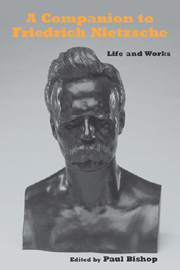Book contents
- Frontmatter
- Contents
- Acknowledgments
- A Note on Editions and Abbreviations
- Introduction
- Link to Nietzsche's Early Writings
- Link to The Birth of Tragedy
- Link to Untimely Meditations
- Link to Human, All Too Human
- Link to Daybreak
- Link to The Gay Science
- Link to Zarathustra
- Link to Beyond Good and Evil
- Link to On the Genealogy of Morals
- Link to The Case of Wagner and Nietzsche contra Wagner
- Link to Twilight of the Idols, The Anti-Christ, and Ecce Homo
- Link to the Nachlass
- Conclusion
- Notes on the Contributors
- Index
Link to Zarathustra
Published online by Cambridge University Press: 05 February 2013
- Frontmatter
- Contents
- Acknowledgments
- A Note on Editions and Abbreviations
- Introduction
- Link to Nietzsche's Early Writings
- Link to The Birth of Tragedy
- Link to Untimely Meditations
- Link to Human, All Too Human
- Link to Daybreak
- Link to The Gay Science
- Link to Zarathustra
- Link to Beyond Good and Evil
- Link to On the Genealogy of Morals
- Link to The Case of Wagner and Nietzsche contra Wagner
- Link to Twilight of the Idols, The Anti-Christ, and Ecce Homo
- Link to the Nachlass
- Conclusion
- Notes on the Contributors
- Index
Summary
The catastrophic breakdown in relations with family and friends alike after the débâcle with Lou von Salomé and Paul Rée left Nietzsche isolated from almost everyone in his life. After his mother accused him of having besmirched the name of his father, Nietzsche packed his bags and left Naumburg for Leipzig in September 1882 (cf. KSB 6, 256 and 326); his sister, Elisabeth, was seemingly unable to understand why Nietzsche was so upset by this remark, but we should remember Nietzsche's identification with his father, following his early death. Although the Pindaric imperative, “become who you are” that Nietzsche had earlier drawn to Lou von Salomé's attention (KSB 6, 203) was one that he continued to urge upon her in the form of her “emancipation from her emancipation” (schließlich muß man sich noch von dieser Emancipation emancipiren; KSB 6, 247–48), his discovery that Lou was, as he told Malwida von Meysenbug, “almost a caricature of what I admire as an ideal” (beinahe die Caricatur dessen, was ich als Ideal verehre; KSB 6, 315), had led to complete disillusionment; Nietzsche's attitude became increasingly grim and bleak. Consumed by his emotions “in the school of the affects” (in der Schule der Affekte), and plagued by bad headaches and migraines, he turned to opium for relief (KSB 6, 306–7).
- Type
- Chapter
- Information
- A Companion to Friedrich NietzscheLife and Works, pp. 193 - 200Publisher: Boydell & BrewerPrint publication year: 2012

